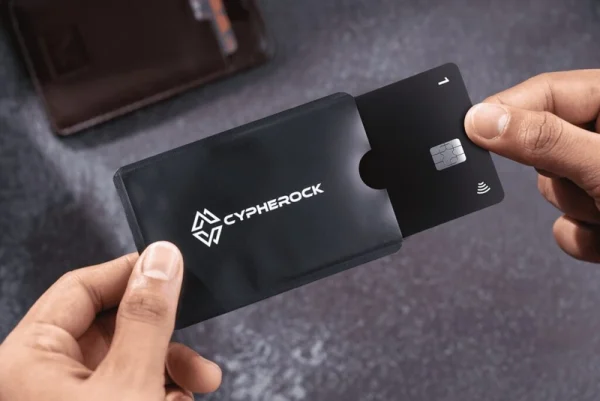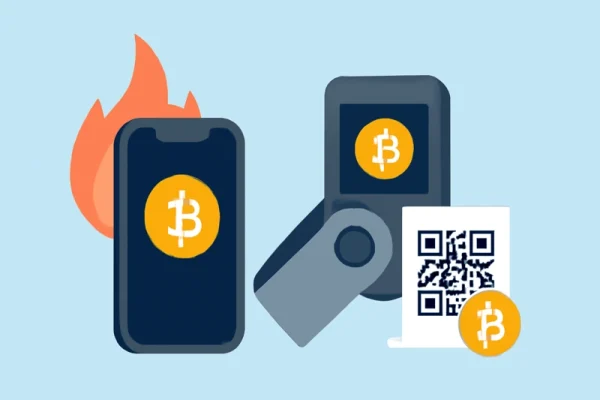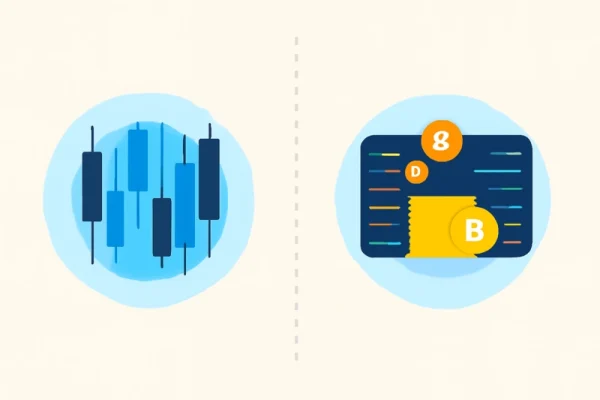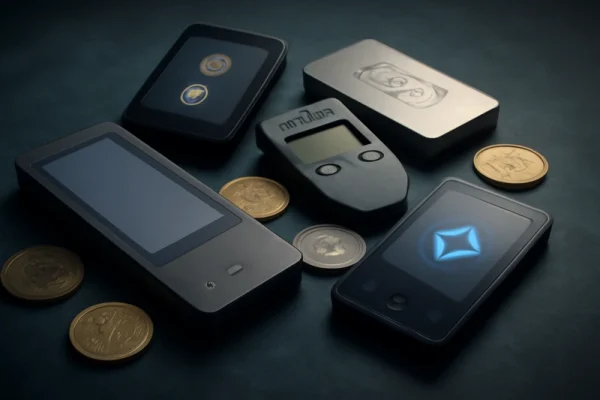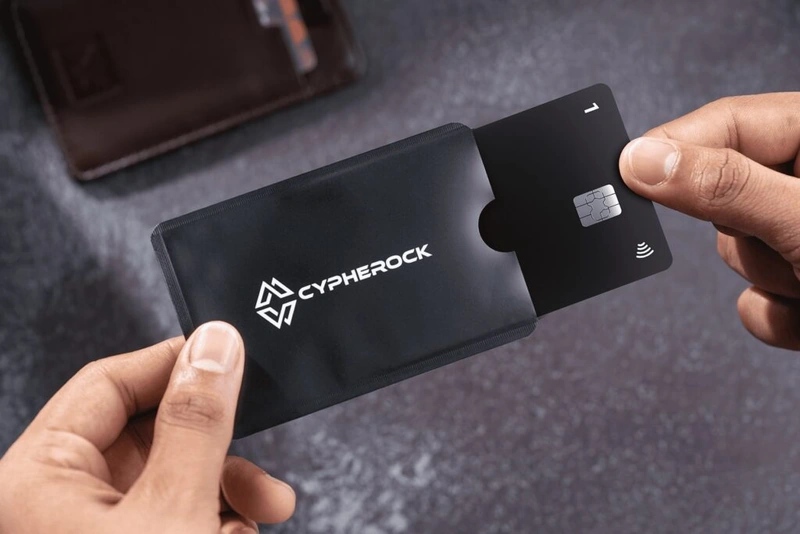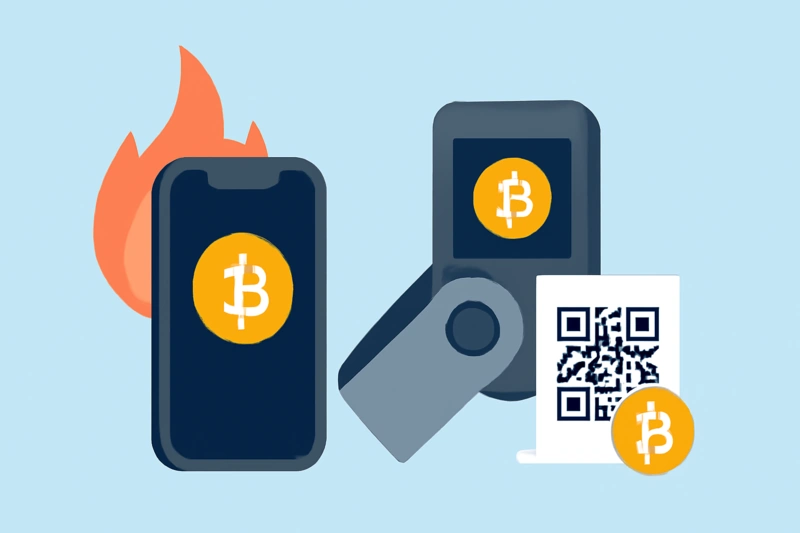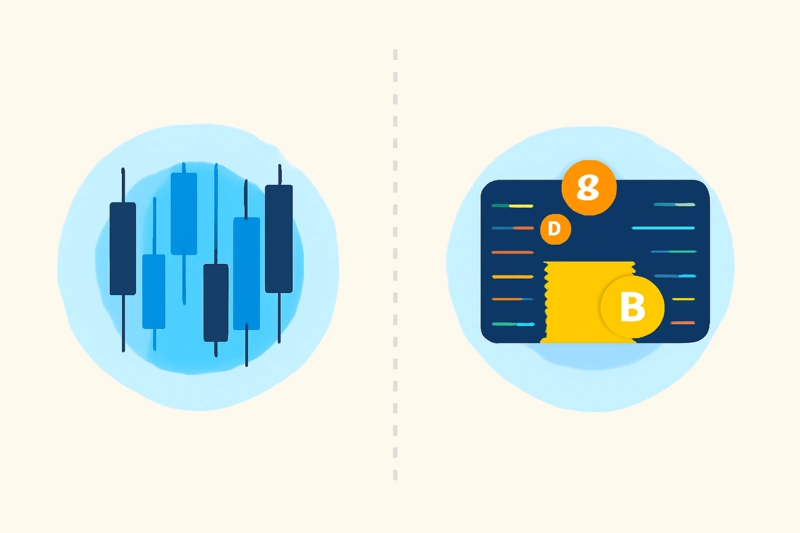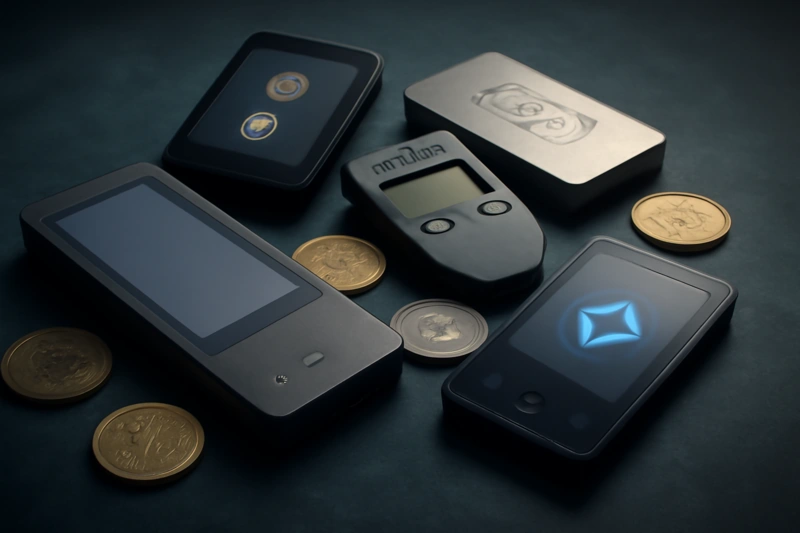What is a DeFi Wallet?
DeFi wallets are cryptocurrency wallets that let their users connect with decentralized finance (DeFi) applications.
They're built to give you complete control over your assets within DeFi ecosystems, meaning no third parties are involved in managing them.
Read more below and you’ll find out about DeFi, DeFi Wallet types, how they work as well as how to set up your own DeFi Wallet.
Table of content
Key Takeaways
- User Control: You own and control your crypto with a DeFi wallet, no middlemen involved.
- Easy Access: Connect easily to various DeFi apps like exchanges and lending platforms.
- Secure Transactions: Uses blockchain technology with public and private keys for safe transactions.
- Different Types: Includes non-custodial, cold (hardware), and web wallets to fit different needs.
- Protect Your Keys: Keep your private keys and seed phrases safe to secure your funds.
What is DeFi?
DeFi is a term for peer-to-peer financial services and transactions on public blockchains. These applications use smart contracts to automate their processes, which ensures transparency and efficiency.
DeFi's main advantage is its ability to provide financial services to people who do not or can not use banks' services.
Traditional financial institutions that control transactions most commonly impose their fees, are subject to various operational inefficiencies, and sometimes limit their services.
Conversely, decentralized finance removes these barriers by creating an ecosystem where users participate freely.
One only needs an internet connection to access decentralized financial products without a bank account or credit score.
Note: Smart contracts are self-executing programs on a blockchain that automatically enforce and execute agreements when certain conditions are met.
Note: A blockchain is a decentralized digital ledger that records transactions across a network of computers in a secure and transparent way.
Note: Peer-to-peer refers to a network where participants interact directly with each other, without relying on a central authority or intermediary.
Role of DeFi Wallet in DeFi
DeFi wallets act as a way for users to access and engage with various DeFi applications. Here's a short rundown of their role in the DeFi ecosystem:
User Control and Ownership: Defi wallets give users complete control over their private keys, ensuring that they have sole ownership of their assets and their management.
Access to DeFi Applications: DeFi wallets are meant to offer seamless connectivity with a wide range of DeFi apps. For example, those designed exchanges, lending and borrowing platforms, yield farming, etc.
Security and Privacy: Since third parties are out of the equation, DeFi wallets enhance security and privacy for their users. As long as only they interact with their wallet, the product minimizes the risks of losing your assets or information to hackers and data breaches commonly associated with centralized institutions.
Cross-Chain Compatibility: DeFi wallets are compatible with multiple blockchain networks. This cross-chain compatibility increases the utility of your currencies and overall allows access to diverse services within the DeFi space.
Ease of Use and User Experience: As the DeFi field grows, modern wallets focus on user-friendly features. This helps lower the entry barrier for new users. Some wallets have integrated features like fiat on-ramps, portfolio tracking, and educational resources.
Definition of DeFi Wallet
A DeFi wallet is a cryptocurrency wallet built specifically for decentralized finance (DeFi) applications. These wallets are necessary for interacting with various DeFi protocols, including decentralized exchanges, lending platforms, and yield farming applications.
DeFi wallets like Phantom Wallet or MetaTask Wallet allow users to store, buy, sell, and manage a wide range of digital assets, such as cryptocurrencies and non-fungible tokens (NFTs).
Unlike traditional wallets offered by centralized exchanges, DeFi wallets are non-custodial. It means that only the wallet owner controls their private keys and, therefore, their funds.
This ensures users have complete ownership and responsibility for their assets without relying on third parties.
Refrain from keeping your public key on your phone or computer due to online risks. It’s always safer to physically write it down and keep it in a safe place.
How Does DeFi Wallet Work?
DeFi wallets interact with decentralized applications (dApps) on blockchain networks, enabling users to trade, lend and stake cryptocurrency directly from the wallet.
DeFi wallets typically give users a private key or recovery phrase, ensuring only the owner can access their assets.
Blockchain Technology
DeFi wallets work within blockchain networks, which are decentralized databases that record crypto transactions across multiple computers.
Each individual transaction is verified and added to a block, which is then linked to previous blocks, creating a chain of blocks.
This chain of blocks, known as the blockchain, provides a transparent and secure record of all financial transactions.
Key Features of Blockchain Technology:
Decentralization: The entire network is not controlled by any single entity, ensuring that transactions are not manipulated or tampered with.
Security: The blockchain's cryptographic algorithms make it extremely difficult to hack or otherwise tamper with.
Transparency: All transactions within the blockchain are publicly visible, thus ensuring accountability.
Immutability: Once the blockchain receives the transaction, it can no longer be deleted or altered.
Networks supporting DeFi
Several blockchain networks support DeFi, with Ethereum being the most widely used in 2026.
Other well-known ones include Binance Smart Chain, Solana, and Polygon. Each network has its specific features and advantages:
Ethereum
Smart Contract Platform: Ethereum pioneered the concept of smart contracts, self-executing contracts with terms directly written into code. This capability has laid the foundation for countless DeFi applications, including decentralized exchanges, lending platforms, and yield farming protocols.
Large Ecosystem: Ethereum boasts a vast ecosystem of developers, tools, and protocols, promoting innovation and competition.
Decentralization: While Ethereum has faced scalability challenges, it remains highly decentralized, ensuring security and resistance to censorship.
Binance Smart Chain (BSC)
BSC offers significantly lower transaction fees than Ethereum, making it attractive for users and developers.
BSC's consensus mechanism, Proof-of-Staked Authority (PoSA), enables faster transaction times.
BSC is compatible with Ethereum Virtual Machine (EVM), allowing developers to port their applications from one network to another easily.
Solana
Solana handles many transactions per second, making it suitable for applications that require high performance, such as decentralized exchanges and NFT marketplaces.
Solana's unique consensus mechanism, PoH, provides a verifiable transaction timeline, improving efficiency and security.
Solana has gained traction recently, attracting many developers and projects.
Polygon
Polygon is a layer-2 scaling solution for Ethereum designed to alleviate network congestion and reduce transaction costs.
Polygon is fully compatible with Ethereum, allowing developers to deploy their smart contracts on both networks.
Polygon offers various scaling solutions, including Plasma, zkRollups, and Optimistic Rollups, providing flexibility for different use.
Arbitum
Arbitrum makes Ethereum transactions faster by processing them off the main network, reducing delays.
It lowers transaction fees by bundling many transactions together, making it cheaper to use Ethereum.
Arbitrum works seamlessly with existing Ethereum apps, so developers and users can switch to it easily without major changes.
Public and Private Keys in DeFi Wallet
The private key generates a digital signature when you send funds from your DeFi wallet. This signature verifies that you authorized the transaction. If the signature matches the public key, the transaction is considered valid and added to the blockchain.
Public Key: A public key is like a digital address that identifies your DeFi wallet on the blockchain. It's essentially the same as your physical address.
This key can be shared freely without compromising the security of your assets or information, just like when someone sends you a letter.
Each DeFi wallet has a unique public key, ensuring funds reach the correct destination.
Private Key: Your private key is a secret code only you should know, like a combination of your personal safe or a password to your online account on social media. The key authorizes transactions and proves that you are the rightful owner of the funds associated with the corresponding public key.
Note: Storing your private key securely is critical to prevent unauthorized access. For maximum protection, consider using cold storage methods on a hardware device such as a cold wallet.
Types of DeFi Wallet
There are several types of DeFi wallets available, each with its own advantages and disadvantages. They come in various forms and operating principles.
Here's a breakdown of three common types:
Cold Wallets
Cold or hardware wallets are physical devices that store private keys offline. They are considered the most secure option for storing cryptocurrency assets.
These devices keep private keys offline, immune to hacking attacks targeting online systems.
They often feature additional security measures, such as biometric authentication or PIN codes, to protect against unauthorized access.
It's worth mentioning that cold wallets typically have limited functionality compared to online wallets, as they require physical access to perform transactions.
Some notable examples of cold wallets are these are: ELLIPAL, Titan 2.0, Ledger Nano S Plus, Trezor Model One, Trezor Model T, Ledger Stax, Blockstream Jade, NGRAVE, and BitBox02
Pros:
Highest Security: Cold wallets offer the most robust security against hacking and theft.
Long-Term Storage: They are ideal for storing large amounts of cryptocurrency for extended periods.
Cons:
Limited Functionality: Some cold wallets may not support all DeFi protocols or features.
Physical Risk: There is a risk of physical loss or damage to the hardware wallet in which case all data would be lost.
Hot Wallets
Non-custodial wallets give you complete control over your private keys, meaning you are solely responsible for the security of your funds.
You have complete ownership and control over your private keys. Non-custodial wallets offer high security, as your funds are not stored on a third-party platform.
Some notable examples of hot wallets are: Trust Wallet, Bybit Web3 Wallet, MetaMask and Phantom.
Pros:
Enhanced Security: Non-custodial wallets provide maximum control over your funds.
Privacy: You have complete control over your personal information.
Cons:
Complexity: They can be more difficult to use and require careful management of your private keys.
Responsibility: You are solely responsible for the security of your funds.
Choosing the right DeFi wallet depends on your individual needs and risk tolerance. If security is your top priority, a cold wallet may be the best option.
A web wallet might be suitable for convenience and a wider range of features. If you value control and privacy, a non-custodial wallet is the way to go.
DeFi Wallet Security
DeFi wallets offer a high degree of control over your cryptocurrency assets, but they also require careful attention to security.
Implementing the following measures can significantly reduce the risk of unauthorized access and protect your funds.
Protecting Your Private Keys
Your private key is the most critical component of your DeFi wallet. It provides access to your funds and should be treated with utmost care. Here are some essential tips for protecting your private key:
Never share your private key with anyone: Keep your private key strictly confidential. Sharing it with anyone could lead to the loss of your funds.
Use a hardware wallet: Consider using a hardware wallet, which stores your private key on a physical device. The device provides an extra layer of security compared to software wallets.
Enable two-factor authentication (2FA): Adding 2FA to your DeFi wallet can make it more difficult for hackers to gain unauthorized access.
Never Give Your Seed Phrase to Anyone
Your seed phrase is a backup phrase that allows you to recover your wallet if you lose access to your device. It's crucial to keep your seed phrase secure and never share it with anyone.
Store your seed phrase safely: Write it down and store it securely away from your device. Consider using a fireproof safe or a password manager.
Avoid sharing your seed phrase online: Never share it with anyone, even if they claim to be from a reputable company.
Note: A seed phrase is a series of randomly generated words used to recover your wallet if you lose access to it. Anyone knowing the seed phrase can control the wallet’s funds so it’s important to store it securely.
Key Features of DeFi Wallet
DeFi wallets, designed for use in decentralized finance applications, offer a range of essential features that make them indispensable for interacting with the DeFi ecosystem.
Decentralization
The core element of DeFi is decentralization, and DeFi wallets are no exception.
This principle means that users have complete control over their private keys and funds, ensuring that a third party does not hold their assets.
This decentralization provides greater security and privacy compared to traditional financial systems.
Interoperability
DeFi wallets excel at interoperability, allowing users to connect to various DeFi protocols and applications easily.
This feature means you can seamlessly transfer assets between different platforms, such as decentralized exchanges (DEXs) like Uniswap, Raydium, or lending protocols.
For example, to purchase cryptocurrencies on Uniswap using a DeFi wallet, you must connect your wallet to the Uniswap platform.
Once connected, you can trade various cryptocurrencies directly from your wallet.
Multi-Chain Support
While not all DeFi wallets support multiple blockchains, this feature is becoming increasingly important.
Multi-chain support enables users to access various DeFi applications across different networks.
For instance, a wallet supporting Ethereum and Binance Smart Chain allows users to participate in DeFi protocols on both networks, potentially increasing their returns.
Setting Up a DeFi Wallet
Setting up a DeFi wallet is relatively straightforward. The user can complete it in a few simple steps:
Step 1: Choose a Wallet Provider
Research different DeFi wallet providers and select one that best suits your needs.
Consider security features, supported networks, and ease of use.
Popular options include MetaMask, Trust Wallet, and Ledger Nano S, among many others.
Step 2: Download and Install the Wallet
Download the wallet app from the official website or app store.
Follow the installation instructions and create a new wallet or import an existing one.
Step 3: Secure Your Wallet
Create a strong password and backup phrase to protect your wallet.
Store your backup phrase securely in a safe place. Best to write it down on paper.
This is the only way to recover your wallet if you lose access to your device.
Step 4: Fund Your Wallet
Purchase cryptocurrency from a centralized exchange or use a peer-to-peer platform.
Transfer the purchased cryptocurrency to your DeFi wallet address.
Step 5: Explore DeFi Applications
Once your wallet is funded, you can start exploring various DeFi applications.
Connect your wallet to platforms like Uniswap, Aave, or Compound to participate in decentralized exchanges, lending, and borrowing.
